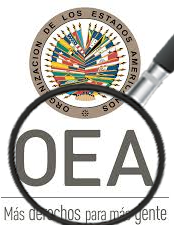Carlos Sánchez Berzaín
January 3, 2019
 (Interamerican Institute for Democracy) The so-called “primary elections” in Bolivia this 27th of January, are but one more link of the chain of crime that Evo Morales commits since long ago to indefinitely hold-on to power. This is the Castroist Chavist scheme that has been applied to Venezuela, Nicaragua, and Cuba, in which there are “elections wherein people vote but do not elect” in order to simulate democracy. The Organization of American States (OAS) has sent an “electoral observation mission of these primary elections” and its assessment is vital for the return of democracy to Bolivia. The OAS Observers’ performance and results are under scrutiny and observation.
(Interamerican Institute for Democracy) The so-called “primary elections” in Bolivia this 27th of January, are but one more link of the chain of crime that Evo Morales commits since long ago to indefinitely hold-on to power. This is the Castroist Chavist scheme that has been applied to Venezuela, Nicaragua, and Cuba, in which there are “elections wherein people vote but do not elect” in order to simulate democracy. The Organization of American States (OAS) has sent an “electoral observation mission of these primary elections” and its assessment is vital for the return of democracy to Bolivia. The OAS Observers’ performance and results are under scrutiny and observation.
There is no doubt the OAS has changed under General Secretary Luis Almagro, compared to the 10 years of his predecessor’s, Jose Miguel Insulza, whose tenure went down in the history books as “a period of subordination of the OAS’ principles and values to the political power of Hugo Chavez’s dictatorial project and his expansion in the Americas.”
If Insulza’s tenure would have at least minimally fulfilled the principles, values, and mandates of the Charter of Bogota, the Interamerican Democratic Charter, the Interamerican Human Rights Convention, and other existing treaties, Venezuela, Cuba, and Nicaragua’s crises would not have happened. Democracies in Ecuador and Bolivia would not have been eliminated, and the use of politics by the Transnational Organized Crime group would not have happened in those countries and in Lula’s and Rousseff’s Brazil, or the Kirchner’s Argentina, and more.
It was during the Insulza’s tenure that the Interamerican Commission on Human Rights and the OAS officials’ structural organization was deliberately staffed with operators who abided by the antidemocratic political actions of Chavez and Castro. Some of them still remain there and are the internal front with which the need for change and return to the OAS’ objectives still clash.
In this same Insulza’s tenure, the OAS was participant, co-author and/or accomplice either by commission or omission, of the implementation of the “electoral system of voting but not electing” with which the Castroist Chavist regimes simulated democracy when, in truth, they were installing and cementing the “21st Century dictatorships in the Americas”.
Insulza’s OAS electoral observer missions approved all electoral fraud; in Venezuela with Chavez and Maduro, in Nicaragua with Ortega, in Bolivia with Morales, in Ecuador with Correa. In 2008 Insulza published an obligatory “Manual for OAS’ Electoral Observation Missions” that turned out to be a mechanism, with forms for the day of elections, that constrains OAS’ observers to limit themselves to focus on merely formal components of what it calls the “concept of democratic elections” and defines that “elections are considered democratic when they meet four basic conditions … they are inclusive, clean, competitive and are the means of access to high public office positions”.
This same regulation -ignoring the Interamerican Democratic Charter’s (IDC) essential components of democracy- states that “one other way to clarify what democratic elections are, is to show that which is not included in this definition”, literally: “in the first place, this definition does not include a range of aspects related to the electoral process, such as; absenteeism, the obligatory nature of voting, the demarcation of voting districts, the electoral formula used to translate quantity of votes into parliamentary seats, and the presence of territorial caucuses … Secondly, it excludes aspects, such as; the independence of electoral authorities and the trust shown by the different actors in the process and in the electoral results … Thirdly, it does not address a myriad of issues that are ordinarily identified as challenges to democratic governance. This definition does not address what happens after an electoral process has been completed …” !! ??
Secretary Almagro is fighting for democracy in the Americas and is advancing. His role regarding Venezuela’s dictatorship is exemplary, his denouncement of Cuba’s dictatorship is true and courageous, his actions regarding Nicaragua’s dictatorship are important. His leadership is essential and strengthening for an OAS that he inherited in shambles and agonizing. This is why Almagro is paying the price of enduring an extensive campaign “to assassinate his reputation” such as his expulsion from Uruguay’s Frente Amplio.
In this context, OAS’ Observers in Bolivia are under observation. We expect a report that; will acknowledge that in Bolivia voters’ human rights are violated, the primary elections are neither clean, nor inclusive, least of all competitive, nor are they fair and free. A manual, or regulation, cannot be above the IDC’s fundamental components of democracy. There is trust in Almagro, whose role in Bolivia cannot be different from that for Venezuela, Cuba, and Nicaragua.
Published in Spanish by Infobae.com on Sunday, January 27th. 2019
Translated from Spanish by; Edgar L. Terrazas, member of the American Translators’ Association, ATA # 234680.
 Carlos Sanchez Berzain Abogado | Estadista | Político | Politólogo
Carlos Sanchez Berzain Abogado | Estadista | Político | Politólogo